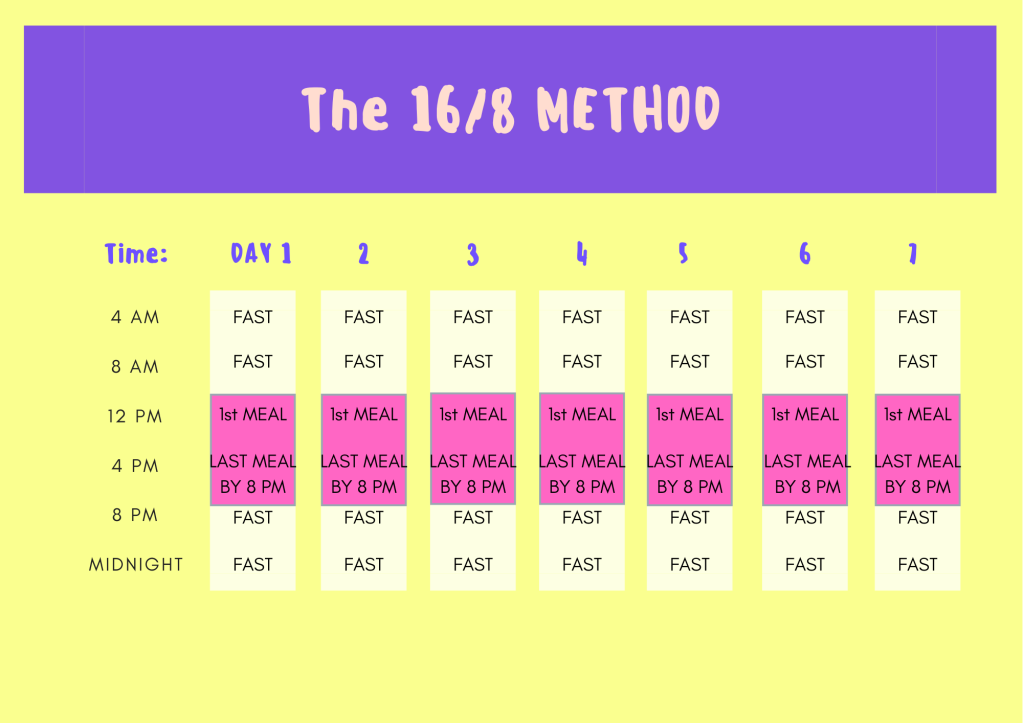Intermittent fasting is claimed with its great effect in helping weight loss and provides various benefits to human body. What is intermittent fasting about? Here is what you should know about intermittent fasting.
Intermittent fasting has recently become a trend for its great effect on weight loss and health benefit. As compared to food diet, intermittent fasting is more likely an eating schedules that incorporate regular periods of low or no food consumption.

In a simple word, it is not about what you eat, it matters about when you eat. Lots of people choose to cut down their calorie’s intake during their weight-loss period.
However, they may not keep it for longer as they have to get off some of their favorite foods that are high-carb or high-fat. Worse is that they will gain back their weight after they stop the diet plan as their metabolism is slower down.
Intermittent fasting provides you a way for fat loss by periodic diet while maintaining your metabolism.
Additionally, it is a good way to keep muscle mass on while getting lean. Throughout the evolutionary history, all organisms achieved their survival and reproductive success depends on their ability to obtain food.

They have evolved behavioural and physiological adaptations that enable them to survive periods of food scarcity or absence.
For mammals, their liver and adipose tissue which function as energy storage that enable fasting or starvation for varying lengths of time depending upon the species.
Therefore, humans are enabling to go into fasted state and the body tissue will work to adapt and provide energy during this state.
BENEFITS
Other than weight loss, intermittent fasting also contributes various advantages to human body.
1. Intermittent fasting reduces the risk of diabetes

A study conducted by Belkacemi showed that IF can relieve the insulin and glucose intolerance in a rat model with type I diabetes.
IF prevents and reverses diabetes in the way that to increase the sensitivity of insulin receptor signalling. Insulin is the hormone secreted when you have taken in food to reduce the blood glucose level. Highly sensitive of insulin receptor signalling can help the response of insulin secretion more readily to stimulate glucose uptake by muscle and liver cells.
Besides, IF also suppress inflammation caused by diabetes in multiple organs, leading to an anti-diabetic effect.
2. Intermittent fasting reduces the risk of cardiovascular diseases

Intermittent fasting reduces the risk of cardiovascular disease and stroke causing by hypertension, low heart-rate variability, insulin resistance and hyperlipidemia.
IF can help to reduce blood pressure and increase heart rate variability and insulin resistance which contributes to the enhance of blood vessel’s dilation. The narrowing of blood vessel is dangerous which cause less blood can be flow to the targeted organ and the narrowed blood vessel in brain is high risk to cause stroke.
IF also reduces the cholesterol level and triglyceride in the blood
3. Cancer

A research on the strictly periodic fasting showed a great decrease in tumour incidence, including tumour onset and reducing the number of sites with tumour-like lesions.
Cancer or tumour cells are the highly growing undifferentiated cells that spread easily on the tissues. It is uncontrollable and can lead to the competition of cancer cells and normal cells.
Cancer is normally treated by surgery and followed by chemotherapy or radiotherapy to control and eliminate the growth of the tumour cells.
However, these methods are non-specific which can also kill the normal cells at the tumour sites. Some papers had stated that fasting is able to protect the normal cells but not cancer cells against high-dose drugs in chemotherapy and this increases the efficacy of chemotherapeutic drugs against cancer.
4. IF helps in weight control

Periodic fasting can drag you out from your normal eating schedule.
Normally, your insulin level increase after each time you take in the food in order to decrease the blood glucose level. The glucose is transformed glycogen for short term and fat for long term storage.
For your daily routine, the glycogen is enough to provide you with enough energy and fat is seldom to be transformed unless you are under starvation. During fasting, your body experiences shortage of glycogen and it will start to transform fat into ketones as the energy source.
However, a long-term fasting can induce the defensive mechanism in your body to slower down your metabolism and you can get your weight back easily after you start to eat food again.
Hence, fasting periodically is suggested to just give the body a short period of 16 hours to one or 2 days without or little amount of food can help to maintain metabolism and lose weight.
TYPES OF INTERMITTENT FASTING
1. Complete alternate-day fasting

Alternate-day fasting has you fast every other day, either by not eating anything or only eating a few hundred calories. In the eating day, you can consume foods and beverages ad libitum.
Extremely no food intake in the alternate fasting day is not suitable for beginners. It is hard to keep on doing it when you have to go bed with the sense of hunger, or you feel down the day with starvation.
2. Modified fasting regimes

This regime allows consumption of 20- 25% of energy needs on schedules fasting days.
The most popular is 5:2 diet, which involves severe energy restriction for 2 non-consecutive days per weeks and ad libitum eating for the other 5 days.
This diet was popularized by British journalist Michael Mosley and also known as Fast Diet. It is recommended that women to take in 500 calories and 600 calories for men on the fasting days.
More extremely, people may just stop to take in any food on their fasting days. Only water, coffee and other zero-calorie beverages are allowed during fasting, without any solid foods are permitted.
For example, you can finish you last meal for dinner and next-time food intake should be the dinner at the other day. In between these 24 hours, you should strictly control you calorie intake to a limit or just stop any solid food.
3. Time-restricted feeding

This diet plan allows food consumption to be restricted to a six- or eight-hour window. During this window, you are allowed to eat ad libitum, two or three meals, to induce regular, extended fasting intervals. So that you will have 16-20 hour without any food intake.
You should identify a suitable window for yourself and keep on practising every day.
Commonly, people will skip their breakfast and have their first meal at 10 am, then stop to eat at 4 pm. It is not that hard because 10 am is not that far from your breakfast time and 4 pm is also quite close to dinner time.
People may feel struggle as they wake up hungrily and want to start their breakfast, but they have to wait until 10 am.
For beginners, it is suggested that you don’t have to start with a very long fasting hour, 12-hour fasting is ideal to use for practise and you can keep adding two hours after you are used to the fasting time until you can maintain a 6-hour eating window per day.
During fasting time, you can most probably drink plain water only, while black coffee and other zero-calorie drinks are allowed if you are hard to bear with it.
4. Religious fasting

Fasting is an important practice in many religious, for both spiritual and physical benefits. This type of fasting consists of various fasting regimes undertaken for religious or spiritual purposes.
For example, members of the Church of Jesus Christ of Latter-Day Saints routinely abstain from food and drink for extended periods of time. They promote a healthy diet and lifestyle as important expressions of their faith, and they live approximately 7.3 years longer than other white adults.
Hence, they practice healthful lifestyle, including not smoking, eating a plant-based diet, and exercising regularly. Some Seventh Day Adventists consume their last of two daily meals in the afternoon, resulting in an extended night-time fasting interval that may be biologically important.
5. Ramadan fasting

This is an important fasting for Muslim during the holy month of Ramadan, they fast from sunrise to sunset throughout the whole month.
The most common dietary practice is to consume on large meal after sunset and one lighter meal before dawn. Besides, they even don’t take in any drink during their fasting period. Depending on the geographical location of those who are fasting during Ramadan, day fasting can vary from 11 to 22 hours.
Islamic fasting during Ramadan does not require energy restriction; however, as the intake of food and fluid during Ramadan becomes less frequent, changes in body weight may occur.
Ramadan fasting is considered as one of the most common form of time-restricted diet. A study reported LDL and fasting blood glucose levels were decreased in both sexes when they took Ramadan fasting. It can also help in weight loss and improve metabolism.
However, this feeding pattern is in biological opposition to human circadian rhythms and therefore, unlikely to be pursued as a desirable weight-loss intervention.
CONCLUSION
Even though, intermittent fasting can provide you a lot of advantages, but you should be careful when you start to practise it. If you have any chronic diseases, such as heart attack, hypertension, you should get an advice from your physician first.
During IF, you can encounter with stress and mood down, you need to try to adjust it and keep motivating yourself. When you absolutely cannot bear with it and you feel suffering, just stop it anyway. IF is different from a long-term fasting, in which it can contribute to a different body transform and metabolism changes.
At the eating period, you should practise yourself out from the junk food or high-calorie food, by reducing little amount everyday and increase the volume of healthy foods. Eat ad libitum isn’t mean you can eat overwhelmingly and destroy your body. But, you may eat a bit more than your normal meal, it is no problem as you will feel hungry more than usual.

